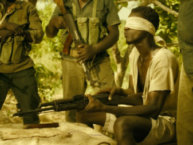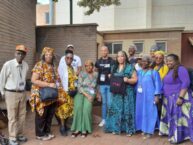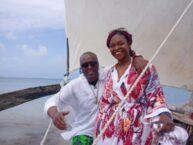We are on the back road of Isu Elementary School where udala trees stick large stems into the friable soil, their fruits ripe and sweet and utterly ours. Abum, Choko, Uzo and 1 squat facing each other over the game of Ncho, sheltered by sunrays waning into a darkened yellow as birds travel in droves to parts distant from ours. We dug two rows of six holes in the ground, and in turns, we pick all the pear seeds from each hole and distribute them into the other holes. We are hastening to end the game because the day’s light is growing dim, just like the hazy light in one eye when you wink. The trees stick towards the sky, whispering a hum.
Out of the corner of my eye I catch a movement, and shadows of three men flit across our game holes. I look up and recognize my brother’s friends, Uch-Man, Sule, and Tear Drop. The fourth friend and my brother’s right hand man, Rat Poison, is not with them.
“Oslo,” Sule calls and I walk towards them. My friends have stopped playing. Uzo and Abum still linger about the game holes.
“Wetin happen?” I ask them when we move beyond the earshot of my friends.
“Police come today. Them carry Ghana Boy.” Sule’s words are like water gargled in the mouth before being spat out. When he says my brother’s name, Ghana Boy, the trees shrivel into the young dusk and the sky retreats beneath the thick clouds sliding across it.
It is then that I see their ruffed shirts, and the disheveled appearance they wear. There are stains like blood on Tear Drop’s boots. They must have been up to their usual business.
“But nothing go happen. Them go release am,” I say to Sule, searching his face in the dying light for reassurance.
This is not the first time my brother is getting arrested. I am not sure how the police manage to get leaks about his operations, and then sneak up on him from the back windows of the houses or grocery shops. Our town Ebii, ripples with relief every time they haul Ghana Boy away. Yet by the next dawn, we all see him alighting from a black jeep, shaking hands, his face with a smile that reveals one broken tooth.
“Oslo, no be ordinary Police carry Ghana Boy,” Sule says and pauses, for what reason I am not certain. I feel my heart wobble. “Na the other Police ― na SARS.”
I move away still facing them, and then I turn and rip into the young night, darting through a shortcut to make it home faster. I hear my friends call out to me, then stillness. I run past the whitewashed Vision College building where I attend the JSS 1 class three times a week; past Unoaku’s house, the girl who makes my heart dance; past our church where I feel God beckon like Pastor Blessing says he does to sinners.
A patch of darkness has swallowed our home, making the two-room bungalow seem ominous. The trees assume new postures, like guards. The darkness is dotted by flickers of torchlights, voices revealed as I inch closer to the house. Our front yard is littered by many of our neighbours. My mother is on the floor sobbing, and Mama Chika, her closest friend from the nearby compound rubs her shoulder. My mother’s polo, splotched with sweat, hugs her body.
When my eyes lock with my mother’s, her expression flips from sorrow to reproach.
“Osonwa,” she calls out.
I halt at the foot of the three steps leading up to the corridor. I want to tell her that I am addressed as Oslo now and no longer Osonwa. She is not done with me.
“Osonwa, I offend God born you and your brother? I offend God born you and Emeka? Where you go since morning? Where Emeka go since two days? I no kill my mother o.”
She breaks into a low-toned sobbing that causes her body to quake. I want to say something to her but my throat is clogged with the disbelief that Ghana Boy has been taken by the SARS.
“Mama Emeka, see you see hypertension o. No let your children send you to early grave,” Mama Chika reminds her. In the yard, one of the men is speaking and everyone else is listening to him. Apart from the occasional hisses from his listeners, I hear none of his words. I slip out of the house to the backyard. My father is not home from his plumbing job. I lean on the back wall. I sit on the pavement. I roam the length of the yard wondering what new scheme this police employed to trap the whiff of air that is my brother.
When Ghana Boy was fourteen, my present age, he stole my father’s work boots from his room. It was the first time I saw Ghana Boy in a different light, from a loving older brother who gave me a ride on his shoulders and gifted me his meat at meals to a thief. My father thrashed him behind our compound with the cane until he confessed to selling the boots.
“I go call the vigilante group for you,” my father threatened.
“No soul go carry Emeka comot from this house. You don flog am. E never do?” My mother’s resonant voice put an end to the matter.
When Ghana Boy grew past stealing from my father, and started breaking windows to steal from people’s houses, my mother scolded him only within the precincts of our household. She addressed him differently in public, and talked about only his past moments of good behaviour ― when he was five and helped her fetch water, when he tried to make soup because she was ill. That reflex of hers, to wallow in lenience for Ghana Boy, remained unchanged.
Near midnight, my father drops into the house like he’s been tossed in. The furrows on his forehead have grown more pleats. The cushion chair squeaks when he crashes into it. He asks for a cup of water. When I reappear with the water, he is saying that he did not see my brother. The SARS officials at Onitsha do not have him. He says he will check the Awka station in the morning. If he does not find him there, he will travel to Ugwuoba to check.
My father hasn’t spoken to my brother for some months. They march past each other in the house, silence walking in between them with comfortable strides. The last time they exchanged words was the night my brother and his boys raided a rice depot. He was not caught – nobody catches the wind – but the whole town knew which gang did it. When my father asked him, trapping him by the waistband of his trousers, he pushed my father’s hands away. Then my father ran to his room and returned with a sinewy cane that he used on us once. It must have been his way of laying claim on a boy whom he cuddled as a baby. But my brother burst into loud mirth and told him to fuck off. It was a deep low hum and the heavens blathered the lines with him. Fuck off. It sounded like a verdict. Then, standardizing the same voice, my father told my brother: Get out. You no be my son.
But my brother kept returning to the house and eating the food my mother covertly reserved for him on a low kitchen stool under our bed. My father never again asked him to leave, never spoke of him or to him, never spared him a glance.
Yet here he is now making plans to travel to far towns just to find his lost sheep. He refers to my brother as ‘he’, as though something in him has sworn never to say the name of his first son.
We pass the night that way, in the suffocating embrace of the heat, my mother’s hands on her head as she mutters, “Chi m egbuom, Emeka egbuo m,” reiterating her god and my brother as the agents of her ruin. We do not change our clothes. We do not eat. We sit on the couches, feeling disjointed and incomplete, swimming between dozing and waking, watching the candle burn into a white static pool.
In the morning as daylight stripes the horizon, I amble up the craggy highland leading out of my street, my stomach growling from the hunger of the night before. The town shops are secured with double padlocks. The sight almost moves me to smile. When Ghana Boy lives in your town even watches will be tethered to the wrists of their owners.
I meet my brother’s boys at the usual point, Rat Poison is with them, on the balcony of an uncompleted building. The smoke from the wee-wee they exhale curl from their mouths into the air shaped like hair waves, then it dissipates into nothing. Rat Poison sees me and sits up.
“No vex about your brother, Oslo. The operation suppose end clean. Na one yeye man just burst our cable,” Rat Poison says and his voice burbles in my ear. My brother’s friends call me Oslo, and this is what it feels like to be a man. Here I am a colleague, a near-equal. I let his salutation blow confidence into my lungs. I pass the whole day there, getting high on the puffs of smoke from their ganja pipes.
My father returns the second day after Ghana Boy’s arrest looking half his size. His eyeballs don’t quite fill up the sockets. When he crumples into a heap on his preferred cushion chair, it appears his shoulders have lost some of their width. I offer him a cup of water at my mother’s prompting but he shakes his head.
“How e go?” my mother asks. He clears his throat repeatedly and heaves himself into a straighter position.
“No case for him at Awka.” He coughs. “They send me go Ugwuoba and I see the case there. They no gree make I see Emeka. They say make I bring one hundred and fifty thousand naira…” He coughs again, the rest of his words mangled up in his throat.
“For wetin?” my mother asks sitting up.
“For bail,” my father mumbles. He looks suddenly old.
I walk out of the house before my mother begins her usual yelps of chi m egbuo m o. I will not be there when she sits on the floor and cries. After my father ignores her for some time, he will pick her up like a large doll and ask her to be reasonable. I do not want to be there for my father to wag his index finger in my face and say, “Emeka own na worst. Your own go be worstest”.
I sit under the shade of the large ube tree outside my house. I look over the spot where my brother and I dug our own Ncho game holes long before he became Ghana Boy. He’d let me win most times, and then he’d crack a smile and say Oslo boy, no do like me o. Dey go school o. I avoid school because I cannot wrap my head around many things, like fractions and equations. I count some pear seeds into the holes. It hurts that I am doing nothing to secure my brother’s release. What hurts even more that I feel needs – to eat, to pass urine and shit. Something cripples my chest and I feel my heart yank itself away from its anchor. I ward off the tears. Oslo Boy can never cry no matter how bad things get. How does Ghana Boy say it?
Odeshi! Nothing dey happen!
Once my father steps out to hunt for the bail money, some of our neighbours trickle into our house as if they are lurking in the shadows of our grief. They surround my mother with tales of the gory acts carried out by SARS on suspected criminals: how they crush men’s balls, how they gouge eyes out, how they execute people at the mouth of a river. My mother groans, hisses, shakes her head and legs at the tales.
After my father’s first day of looking for money, and my mother’s futile effort to get help from her relatives, I learn that we are more alone than we know. My brother’s friends appear to have escaped the confines of grief and moved on to newer things. I also realize that as the clock ticks, love defrosts.
My father gets the whole amount one day later from the deadline he was given. He proposes that we all go together to Ugwuoba. Perhaps, the family of the convict appearing at the SARS doorstep will make the bail easier. My mother unfastens the brown sneakers I’m putting on, a gift from Ghana Boy for my birthday. She insists that I wear an old pair of slip-on so as not to appear arrogant. I change my rugged denim jeans too. Jeans dey too bold, she says. As we trek to the bus stop, I pray that none of my peers sees me in the ragged outfit.
“Sir, We come for my son, Emeka Eloka,” my father says to an officer through a peep hole in the gate, a name he hasn’t said for months now filling up his mouth. My father wears a smile, the kind you wear when you answer your landlord’s knocks on your front door, whether or not you owe. My mother is too worried to smile but she too has an expression on her face that is careful not to offend.
“Emeka Ghana Boy?”
“Yes sir,” my father replies. I see shame and pain meld on his face.
“Mopol! Ahijo dey?” the officer asks someone in the compound.
An indistinct shout that sounds like Ahijo dey scales the wall and reaches us. The man lets us in. The buildings stand carefully apart from one another. Empty dry gin sachets and plastic bottles litter the yard. An odd hint of danger lurks in the air.
“Pour your phones for this nylon. Go straight to that building!” the man who let us in instructs.
The yellow walls of the office are greying from possibly hundreds of fingers grazing the surfaces. My father goes to Ahijo’s table. My mother and I stand some distance behind.
“So you are that rogue’s father?” Ahijo asks staring at my father like his sperm cells had been deficient in the process of moulding my brother. There are two big lumps on Ahijo’s temples as if God slammed him with a hammer.
“Sorry sir. To train children of nowadays dey very hard. You tell them something but dem go do another thing.”
“You know that robber killed a man?” he asks my father, giving him a half smile. A low gasp escapes my mother and she folds her arms, squeezing her hands underneath her armpits.
“Sir, Emeka na my son but I no go try defend am.” My father’s voice is losing warmth, the confidence oozing from it earlier drying up.
The only time I have seen my brother pull the trigger on someone was the day I was hanging out with him and his friends. Though he chided me for not being in school that day, he still allowed me trail behind him. I was devouring a bottle of Smirnoff Ice when another group of boys walked into the building. They argued in low voices at first and then the noise splintered the roof into bits. I heard someone begging; Ghana Boy, abeg, no fuck up. My brother’s voice came next, a rumble of thunder: You get luck say my little bro dey here. I for shatter your brains.
Just as I exhaled in relief, my brother sent a bullet into the boy’s leg amidst screams. That was when I knew that my brother’s fraction inside Ghana Boy was lessening to about 1/10.
“Mr. Eloka, you are twenty-four hours behind the time we gave you,” Ahijo pronounces again. My father strives to explain how difficult it was to raise such a large amount of money in two days. My mother goes closer to the table. I follow her, not as Oslo any longer, but as Osonwa Maduabuchi Eloka, the boy my parents have always insisted I still am. My palms are growing sweaty.
“Abeg sir, we fit talk this thing between us. Our money even dey complete, sir,” my mother pleads with Ahijo. The man chuckles, it’s a sad sound that dislodges a deep feeling of dread in my chest. He says,
“Madam, this one don pass money matter o. Your son no dey with us again.”
“Wetin you mean? Where Emeka dey? You don transfer am? But you tell us to bring money, you still go transfer am!” My mother begins to shout. My father grabs her hand, smothering the sparks emitting from her eyes.
“Sir, abeg, where you post Emeka go?” My father supplicates.
“Oga, your son don go the other side, I no go lie to you.”
Ahijo’s voice is no longer so audacious, nor his face so mean. He appears a little nervous.
My mother flies to Ahijo’s throat, wrings the collar of his black shirt into a knot. My father does not try to stop her.
“Find my son give me now! I no go leave this place until you give me Emeka! Give me my son wey I carry for nine months; my son wey I don feed for nineteen years!” My mother’s screams torch the room up to its roof. I wonder why she fights the man. If Ghana Boy is not with them, he is definitely in another cell and only good conduct will lead us to him.
Some officers barge into the room at this point. They try to disentangle my mother’s hands from Ahijo’s neck, speaking all at once.
“Madam! Madam!”
“Oga, control your wife. It is a punishable offence to attack a police officer.”
But my father is all jittery, too weak to bridge the tide of my mother’s rage. So he lets it flow. He rewraps the money with the nylon bag and fiddles nonstop with it. It is perhaps my father’s reticent reaction that makes the information, Oga, your son don go the other side hit home. I go blank for long seconds. The officers wrestle my mother’s hands free and she crashes to the floor.
“Oga,” one of the officers addresses my father, “Ghana Boy’s case was beyond us. He posed a security risk and had to be resolved.”
“Chi m egbuo m! Emeka egbuo m!” my mother’s wails echo through the room.
“I wan see his body,” my father requests in a small voice warped by pain. Most of the officers are trickling out of the room.
“Oga, it is not in our place anymore,” another officer says. No, you cannot see Ghana Boy’s body, he also says. All executed criminals are government property.
The officers garnish Ghana Boy’s execution with strange terms, resolved and property. How can Emeka Eloka, aka Ghana Boy, the harmattan wind, the pin-sized bullet, the blazing charcoal, allow himself to be resolved? My brother lived his short life birdlike, free. He could not even be my father’s son, and now he let the government tag him as property? Sharp stings of pain impale me.
The news travels ahead of us and pricks the town awake. A small crowd is waiting for us at the bus stop. The women restrain my mother who spills her grief all over the road, flapping her large body like cat fish. I walk to Isu Elementary School, deserted by pupils for the day, and sit on a chipped cement block by a classroom wall.
Then I see him approaching, trousers sagged below ass level. A bright light that stifles everything encircles him. His hair is cropped unusually low to his scalp.
“Oslo, wetin you dey do for here?” His voice booms like it comes from beyond the sky and pounds on walls, on trees.
I gape at him, my brain unable to stitch together the meaning of this spectacle. The grass is lush and green against the hem of his trousers.
“This thing you dey do no be life o, Oslo. Make you dey go school.” He swaggers away, and then he reappears. There is a thin stream of blood spurting from his forehead. His eyes are pale, the life in them melting away through the beads of sweat and blood on his brow.
“Wetin Ma cook for house?” he asks and then he thaws out. I spring to get hold of him but he is Ghana Boy, a cold barrel of air. Who can trap air?
I push my face into my palms and I cry and cry.





